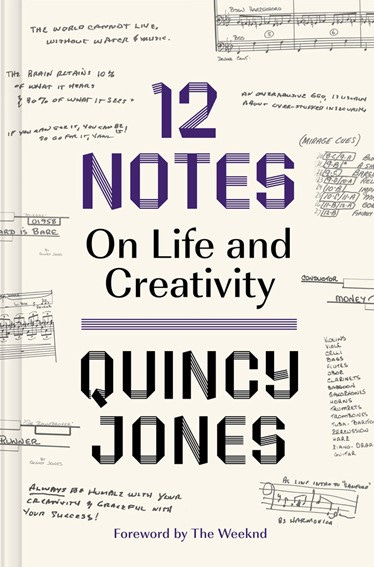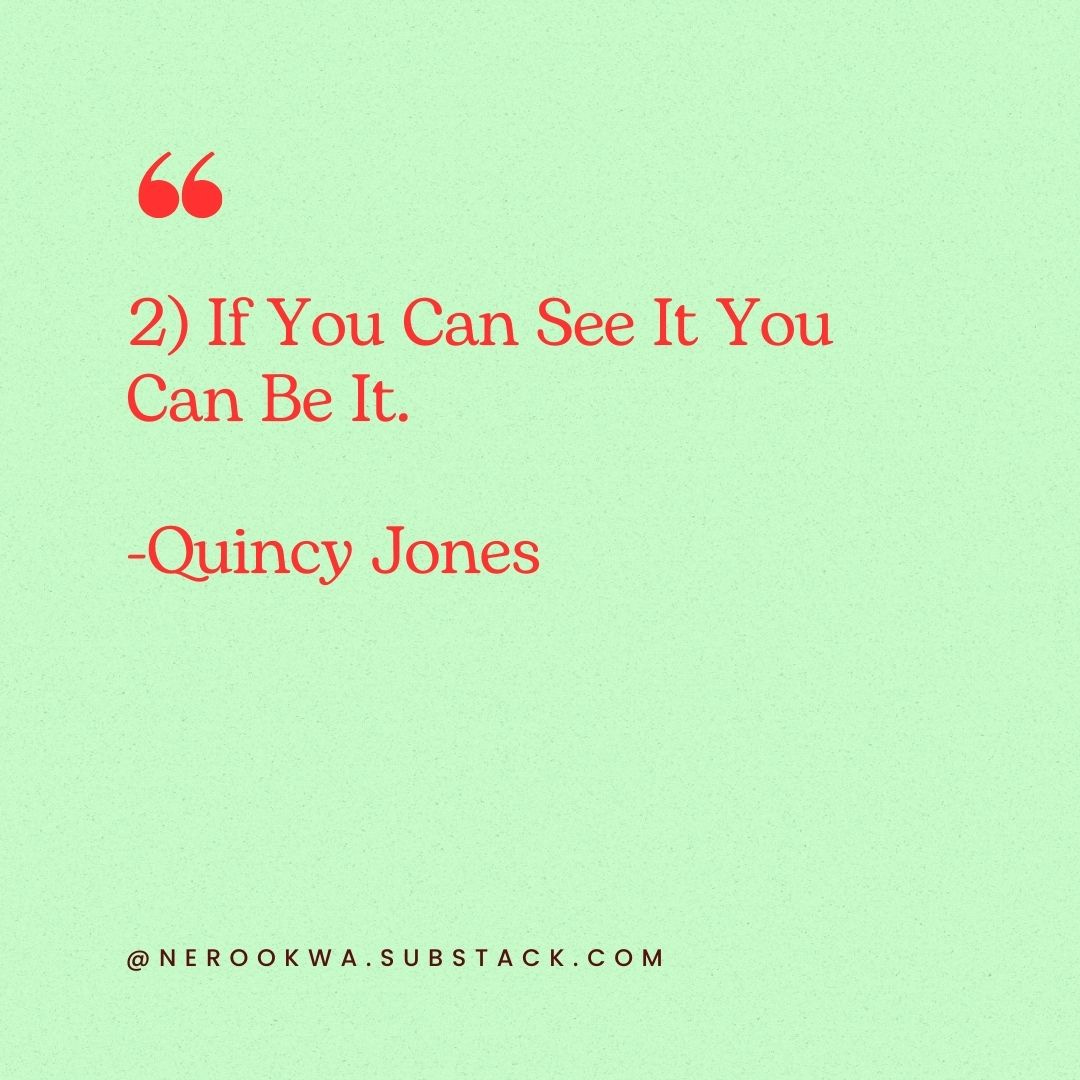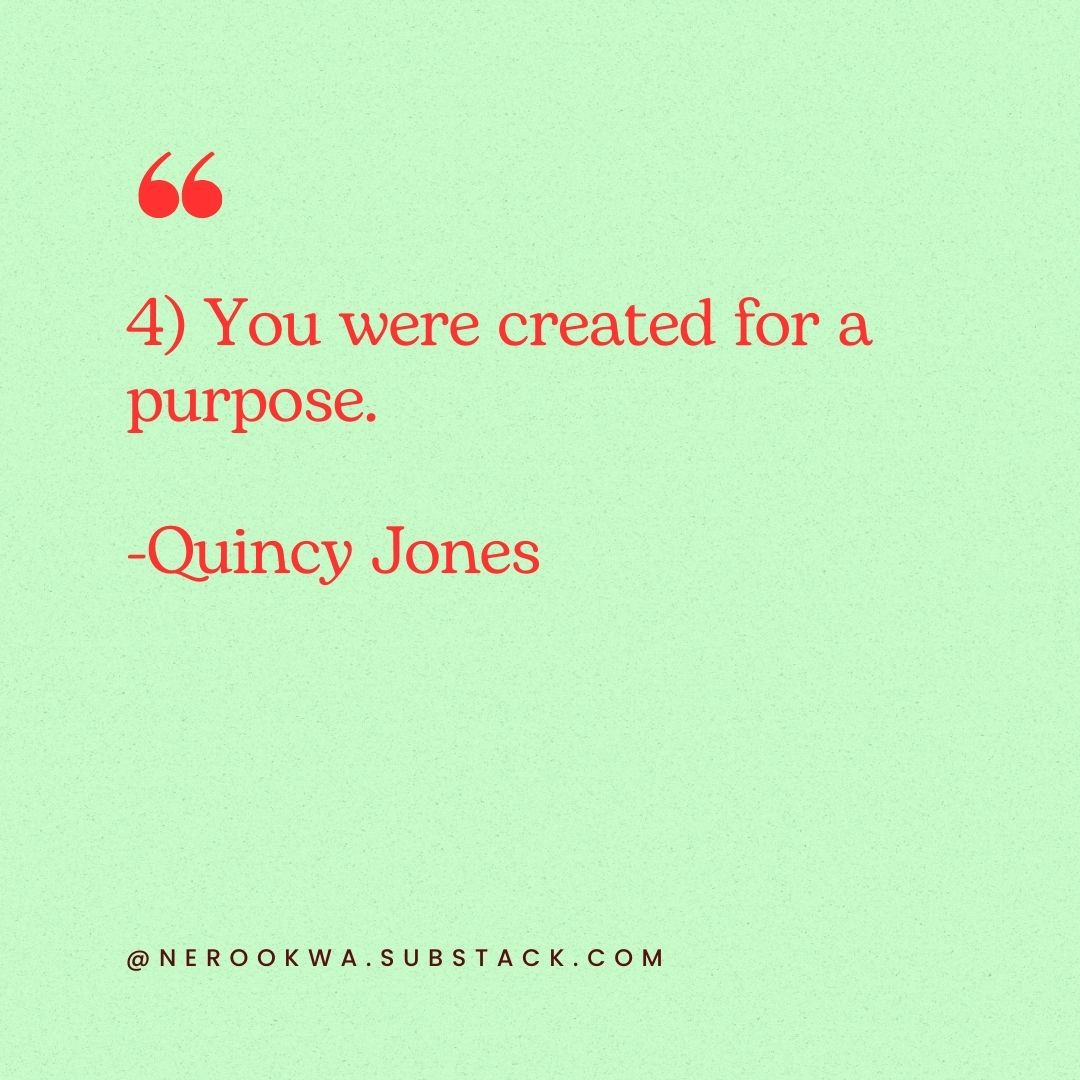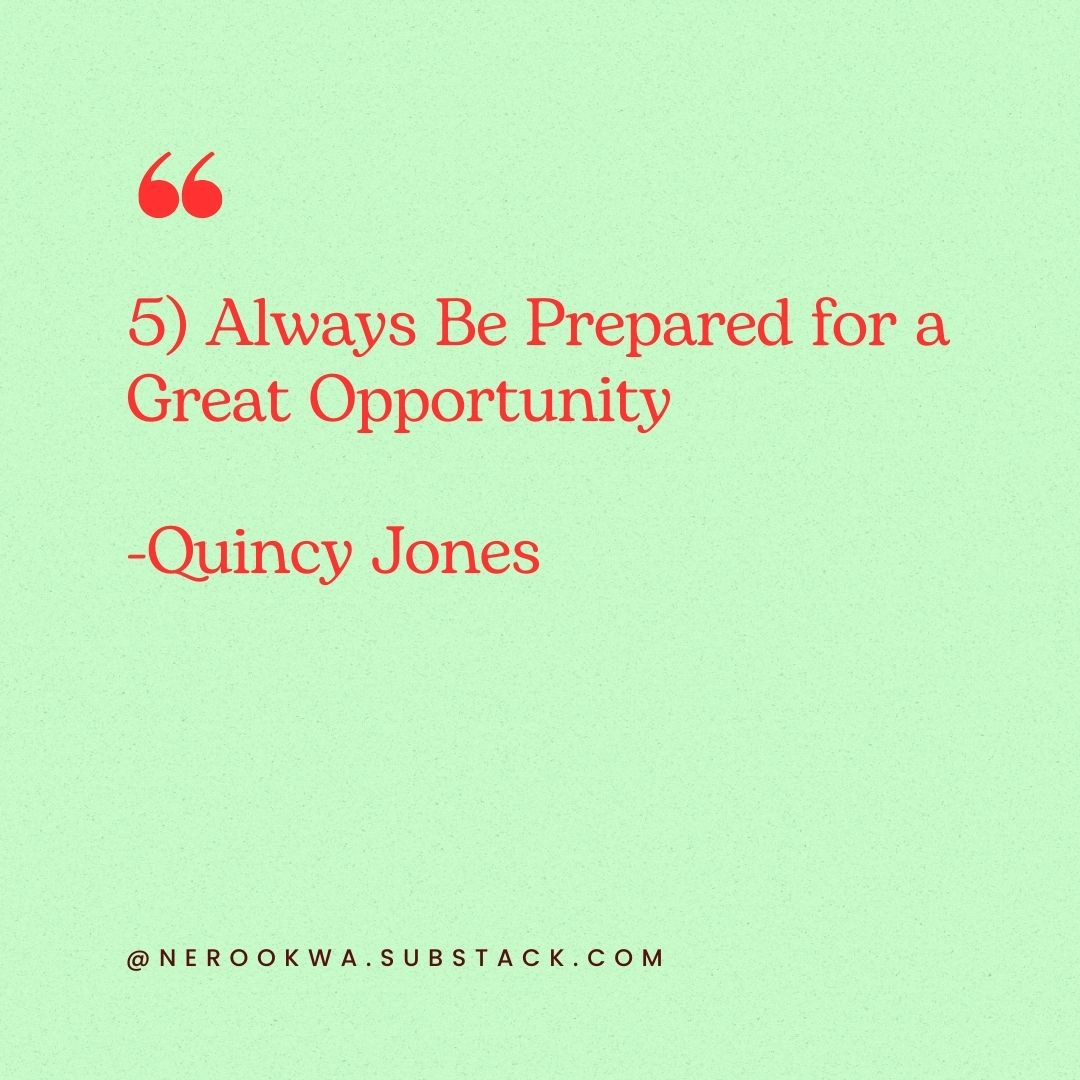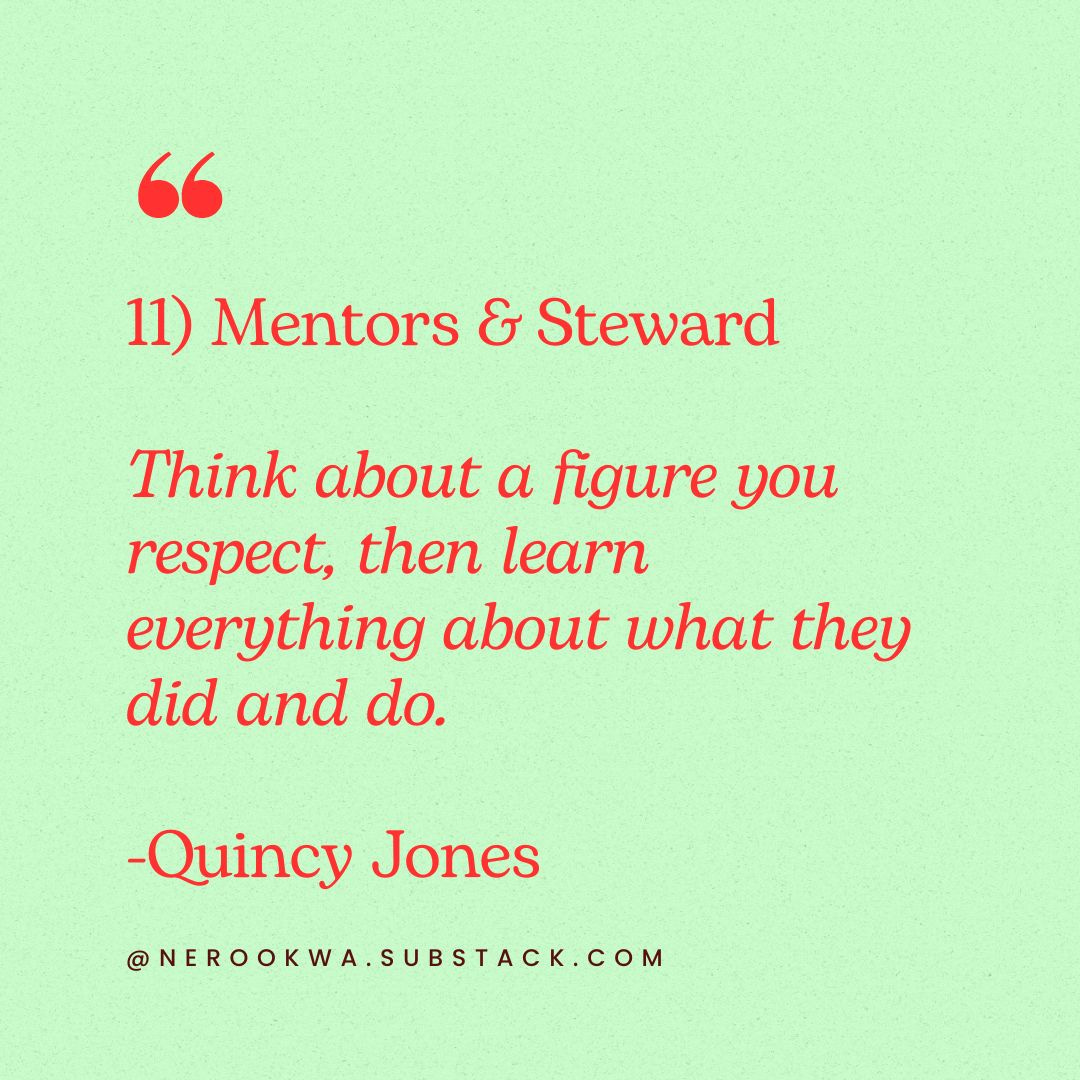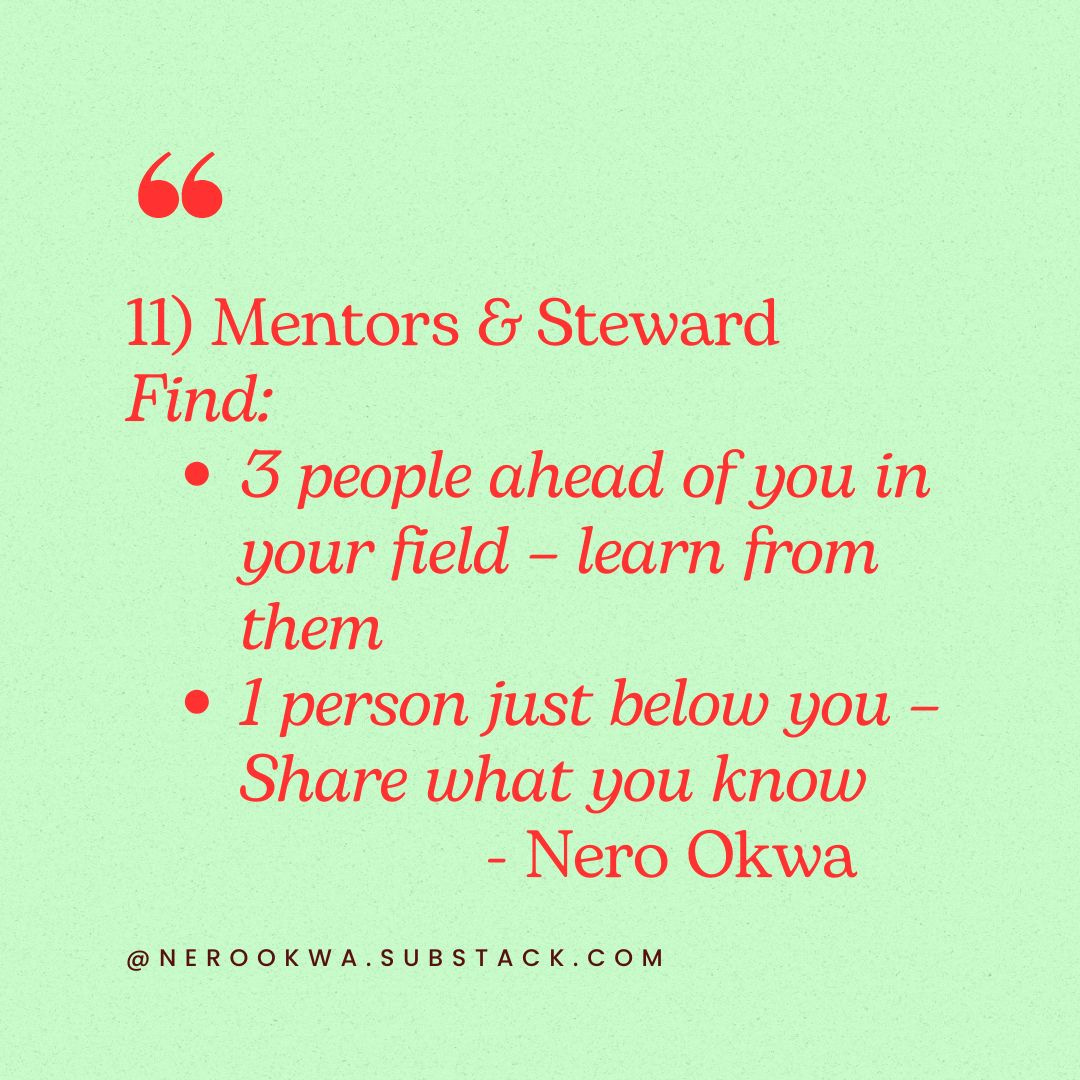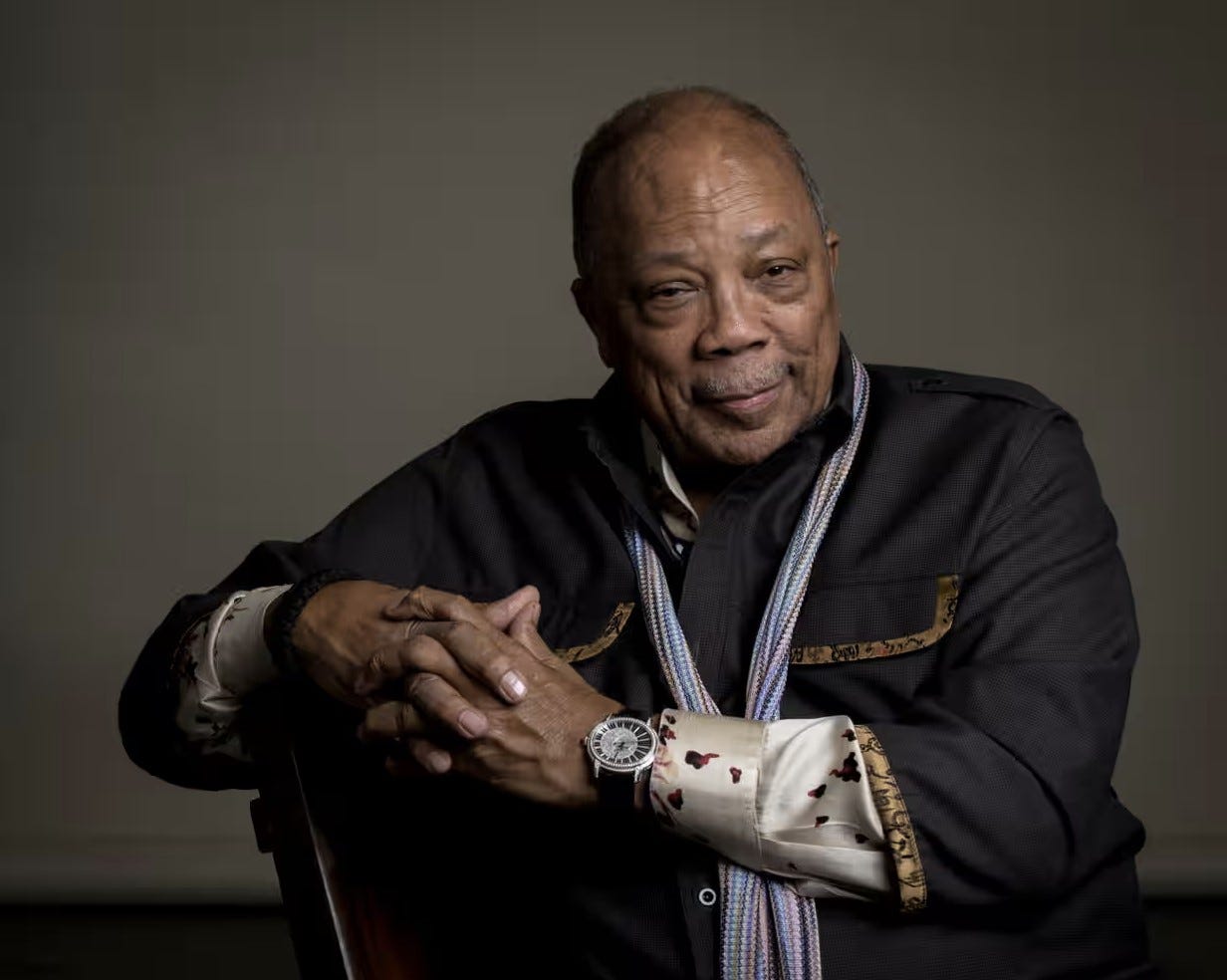
Dear Reader,
Prepare to be inspired. Today, I would share a story of the extraordinary life, work, and creative genius of a true icon: Quincy Jones. We would explore his wisdom through the lens of his book, 12 Notes on Life and Creativity by Quincy Jones.
Who is Quincy Jones?
Quincy Jones (Quincy Delight Jones Jr.) is a name synonymous with musical innovation and entertainment mastery. This legendary figure conquered the realms of record production, jazz, film composition, and the broader entertainment industry. Across a remarkable 70-year career, his accolades are staggering: a record-breaking 28 Grammy Awards, a Primetime Emmy, and nominations for seven Oscars and four Golden Globes.
His collaborators include the who's who of music royalty: Frank Sinatra, Miles Davis, Ray Charles, jazz legend Count Basie, and, of course, Michael Jackson.
Jones's influence shaped three of Jackson's most iconic albums: Off the Wall (1979), the monumental Thriller (1982), and Bad (1987). Thriller, as we know, became the best-selling album of all time.
A successful film producer with shows like "Fresh Prince of Bel-Air". Even in his 80s, Quincy Jones pushed boundaries launching the on-demand music TV service Qwest TV.
And in 1985, Jones orchestrated the powerful charity single "We Are the World," uniting America's top voices to support famine relief in Ethiopia.
The Book: 12 Notes on Life and Creativity
12 Notes by Quincy Jones is a book written as a personal development guide. In 176 pages, Quincy identifies 12 lessons, 12 (musical) notes on Life and Creativity from his experience and incredible career.
I love how he interweaves his life story, and creative process, as examples in each of the notes/chapters. The purpose of this book is to inspire creativity and personal growth, and today I am excited to share my key takeaways from this inspiring book. Enjoy! 😊
12 Notes on Life and Creativity by Quincy Jones
Here are the 12 Notes from Quincy Jones's book:
A – Recycle Your Pain into Purpose
A# - If You Can See It You Can Be It
B – You Gotta Go to Know
C – Establish Your Guideposts
C# - Always Be Prepared for a Great Opportunity
D – Sharpen Your Left Brain
D# - Avoid Paralysis from Analysis
E – The Power of Being Underestimated
F – Do What’s Never Been Done Before
F# - Understand the Value of Relationships
G – Share What You Know
G# - Recognize the Value of Life
I would briefly summarise the lesson from each note, and dive deeper into the ones I found most compelling.
Lesson 1 - Note A – Recycle Your Pain into Purpose
Quincy Jones opens 12 Notes by dissecting creativity into its two fundamental components: science and soul, the left and right brain.
The scientific aspect, he argues, can be learned and honed through practice. But the soulful element, born from our emotions and lived experiences – our very essence as human beings – is something that can't be taught, but can be harnessed.
Instead of succumbing to adversity, disappointment, or anger, Quincy urges us to channel these experiences into something larger than ourselves: our creativity. He illustrates this with a powerful personal anecdote. At just nine years old, he visited his mother in a mental institution after she was diagnosed with schizophrenia, a deeply unsettling experience. Adding to the trauma, she didn't recognize him or his brother.
For two years, Quincy was plagued by a recurring nightmare: he'd be playing classical music on a piano when his mother would appear, urging him to stop, her voice fracturing into a chorus of identical commands. His nightly response? "Please stop it! Somebody sing about love. Somebody sing about lovin' me." The more forcefully he declared this, the sooner the voices would fall silent, restoring a semblance of peace to his tormented sleep.
This harrowing experience, he reveals, foreshadowed his future.
Quincy:
Little did I know that my response to her demands in my nightmares proved to be indicative of who I would become in the long run. Although I hadn’t yet learned to play instruments at that age – I was only ten years old – it was as if the piano in my nightmares served to foreshadow the path that lay before me, and prove that music would be my weapon. I would use it not only calm the voices in my head, but also to spread the sense of joy that I longed for.
Quincy concludes this chapter with a powerful call to recycle our pain into purpose:
Whenever we get hung up and locked in the past, we are completely robbing ourselves of the present, and definitely the future. We can sit in the negativity of the days gone by or we can use it as fuel to propel our creativity, and life, forward... I’ve had to make a conscious, daily decision that I wasn’t going to destroy myself, but instead I was going to redirect that energy and put it into a song, an arrangement, a record, or a movie – kind of like taking garbage and making recycled paper out of it. It’s not easy. But it’s possible.
He emphasizes that whether our creations stem from pain or joy, the world needs our talents:
My hope is that as you continue to read this book, you’ll be encouraged to create. Not only for yourself, but others. Whatever you create from a position of pain or jubilation, we need you, your gifts, and your talents. And I say that from experience – more than eighty-eight years of it.
Lesson 2 - Note A# - If You Can See It You Can Be It
In this chapter, Quincy emphasizes the crucial role of envisioning your desired future – having tangible examples and role models to guide your dreams and career aspirations. This is particularly vital when growing up in an environment that offers little hope.
Quincy's own story paints a vivid picture:
“Having grown up in the South Side of Chicago – the biggest Black ghetto in America during the Great Depression – I didn’t exactly come up in an environment that fostered childhood safety, let alone encourage personal drive and ambition.”
Breaking and entering. Stealing and escaping. That was our life, day in and day out. Aside from school, there were no playgrounds, parks, or anything remotely safe to keep us occupied.”
“Despite this, I’ve noticed that one of the main factors in my ability to outgrow my circumstance was my increased exposure to hope, and my relentless pursuit of it.
A pivotal moment occurred during a late-night escapade with his stepbrothers. Their target: the local Rec Centre’s freezers, rumoured to be stocked with lemon meringue pie and ice cream.
Lloyd, my new stepbrother Waymond, and I broke in... We ate it all up, had a food fight then split up to explore the building. I peered in one office and was about to close the door when all I saw was a little spinet piano in the corner. But with unquenchable curiosity, it was as if something deep inside ordered me to 'Go back into that room!'"
I slowly walked over and ran my fingers across the keys. I’m telling you, it was as if every cell in my body yelled, 'This is what you’re going to do the rest of your life!' I didn’t really understand what that feeling meant, but something about hearing the sound of the piano brought me peace. I didn’t know how it worked, or even how to play it, but each note I struck seemed to be paired with an increasing desire to understand how the sound was generated.
The encounter was transformative.
My brothers caught up with me, and we made our escape from the building unscathed. But I’d been enraptured, captivated by another force. No matter how hard I tried, I couldn’t shake the feeling that I needed to get back to that piano
He did manage to break in a few more times until the kind superintendent, Mrs. Ayres, started unlocking the door for him. With access to the instrument, he began to explore.
With my newfound access to this magnificent instrument, I tried to mimic the sounds I had heard at the old Baptist Church I attended in Chicago (little did I know I was playing be the ear) … The music flowed straight from my heart; it was unlike any feeling I had ever felt before.”
Quincy's passion ignited, he found mentors and resources to nurture his burgeoning talent. A local music teacher, Joseph Powe, who led a navy swing band at the Rec Center, recognized Quincy's interest and invited him to join his a cappella singing group. This opened up a new world:
During rehearsal at Mr. Powe’s home, I couldn’t help but notice all the books he had lying around - from Glenn Miller on arranging to Frank Skinner on film scoring. I had never heard of those professions, but the books kept opening my eyes to a world of musical possibilities. I had a voracious appetite for understanding where music could take me, so when he asked if I could babysit his kids one day, I immediately said, “Yes,” just so I could spend more time reading.
After junior high, Quincy attended the high school across the street. There, his music teacher, Parker Cook, noticed his fascination with the trumpet and gave him free access to the band room to practice.
Quincy recalls, “It seemed as though I had waited a lifetime to finally put my hands on this one instrument, so I didn’t mind the fact that it was a bit worn… Mr. Cook continuously provided me with the space to envision what I could be – more than a baby gangster from the projects.”

He emphasizes the importance of exposure to positive examples:
“It is important to recognize that the only reason I was able to envision a way out of the situation I was born into was because I was exposed to a hopeful path. Mine came in the form of creativity, but I want you to know that being creative isn’t simply a matter of what type of brushstroke you use to establish form on a canvas, or what key changes you write into a song. Rather, I believe that survival is also an act of creativity. It's a matter of seeking out new ways to stay inspired, and creating paths that lead to a better future for yourself, and in turn, others.”
This period marked a turning point: "My thoughts were no longer consumed by purposeless activities, but by dedicated curiosity. It was as if someone had lit a flame within me and I could finally see what had been lurking in the shadows."
Quincy's story resonates deeply, highlighting the power of hope, the journey of personal growth, and the potential to overcome limitations. From discovering his passion at the piano, to the support of Mrs. Ayres and his school music teachers, to fuelling his curiosity with books and instruments, Quincy's path demonstrates the transformative effect of envisioning a better future.
He concludes with this powerful message:
“Life is a beautiful responsibility, but it’s also a beautiful burden. It’s ultimately yours to protect for the time you’ve been given. Whether you’re on the side of seeking out hope or in a position to help spread it, I’m telling you right now: You are more courageous than you think., wiser than you know, and more loved than you could ever imagine.”
And finally, the core message of the chapter: "If you can see it, you can be it.”
Lesson 3 - Note B – You Gotta Go to Know
This chapter emphasizes the importance of immersing oneself in the native culture of any place you visit – experiencing the food, music, language, and connecting with the people.
Quincy argues that this not only deepens our understanding of the world and makes our shared human experience more meaningful, but also provides a richer well of knowledge to draw from, ultimately making us more creative individuals.
Quincy writes:
“For example, my creativity comes from my experiences, and without experiencing more of the world, I would only be able to create from a limited perspective.
Think about “We Are the World.” The 1985 charity single we produced that went on to become the bestselling single of all time. There’s no way I could’ve been a part of that if I didn’t truly immerse myself in what the world was going through, including poverty, hunger, strife, and a myriad of ailments”.
He poses a powerful question:
“How can you expect to create art that transcends cultural boundaries if you yourself aren’t even able to relate to someone on the other side of your city? One of the main ways I have been able to achieve this is by traveling and directly immersing myself in other cultures – from the language to the food to the music”.
This lesson was instilled in a young Quincy during a European tour with more experienced jazz musicians.
Since I was the youngest one at eighteen years old, some of the older cats would always be pullin’ me aside to drop some advice. The phrase that they’d all say – everyone from Count Basie, to Coleman Hawkins, to Benny Carter – was, “Youngblood, step into my office for a few ticks. Let me teach you something”
The legendary saxophonist Ben Webster gave Quincy some particularly valuable advice: when visiting a new country, learn 30-40 words of the language, listen to the music, and try the food.
Quincy recounts:
Right before I toured to Europe for the first time with Hamp in 1953, Ben pulled me aside and said, “Youngblood. Wherever you go in the world with Hamp, I want you to learn thirty to forty words in every language of every country you go to. If you learn the language, that’ll take you to the food and the music.
Then I want you to listen to the same music they listen to and eat the same food they eat because the soul of a country is identified by its music, food, and language. You’ve simply go to go to know.” I kept his advice in my back pocket and anxiously waited to put into practice on the road.
In a way, I felt as though Ben handed me the secret code to life… After coming from the ghetto in Chicago, I only knew what was familiar to me. After experimenting abroad with new languages, food, and music, though, an entirely new world opened up, breathing more life into my own.
Quincy embraced this lesson throughout his life, learning the basics of approximately 27 languages, including French, Swedish, Serbo-Croatian, Farsi, Iranian, Turkish, Greek, Russian, and more.
He encourages readers to do the same:
“So, if you only take away one thing from this Note, please hear me when I say, you gotta “go to know.” Je t’aime dix mille fois!”
Lesson 4 - Note C – Establish Your Guideposts
This chapter resonated deeply with me, highlighting the critical need to establish guideposts – daily affirmations, a clear sense of identity – before facing the inevitable challenges, struggles, and desperation that often accompany the pursuit of our aspirations.
Quincy shares a powerful story from his early career. At 26, he was experiencing success, having assembled an exceptional 18-artist band, "Free and Easy," for a European tour. The initial performances in Brussels and Holland were triumphs. But upon returning to Paris for the official tour opening, everything that could go wrong, did.
It was the height of the French-Algerian War for Independence. The sounds of machine guns and the heavy presence of soldiers on the streets of Paris kept everyone indoors, decimating theatre attendance. The show was haemorrhaging money.
Quincy recounts:
With only fourteen days left to go, the producer gathered the cast and crew on a Thursday and broke the news: “The plane is leaving on Saturday. If any of you miss that flight, you’re going to be stuck here”
Despite the chaos, Quincy desperately tried to salvage the tour. He secured two shows – one in Paris and another in Stockholm – and needed to fill the remaining dates. He connected with a French promoter who promised sixteen dates in France and cash advances for each.
Quincy writes:
Knowing I had that money waiting for us, I chartered a raggedy li’l plane to take us to Stockholm, Sweden, to finish our gig over the weekend.
However, when we returned to Paris, the French promoter had skipped town with our advances for the sixteen dates – he and our money were long gone. One thing that remained was the Algerian War. It was an incredibly unsafe climate to travel in, and I had no manager or booking agent. I had practically no experience booking a tour.
He embarked on a gruelling journey, dragging his 33-person group (including families) across Europe – Holland, Belgium, Italy, Yugoslavia, Finland, Austria, Germany, Sweden, back to Germany, then France, Switzerland, and Portugal. "We wandered around like vagabonds, traveling by bus, train, car, or foot. While piecing together loose change to keep us fuelled, I put in calls to friends far and wide to see if they needed a band."
A glimmer of hope appeared when concert promoter Norman Granz offered them a three-week opening slot for Nat King Cole's European tour. This provided much-needed cash, but after the tour, Quincy was back where he started: broke. "To be real, we were always broke, but now we were broke, broke."
Just when things seemed hopeless, Brice Somers, an executive at Mercury Records, and his wife bailed them out of Yugoslavia with a paid train car. This left Quincy with $62,000 in virtually worthless Yugoslavian currency.
He pushed on, but the strain was immense:
After about ten months of dragging thirty-three people across Europe and having to come up with $4,800 a week just to cover their basic needs, everything within me was shutting down. My mind, body, and soul. I had been alive for 26 years, but it felt as though the weight of the world had aged me threefold. Each of the musicians was starting to crack as well.
In Turku, Finland, at his breaking point, Quincy contemplated suicide. "Inside my room, I kept replaying the events of the last few months over and over in my mind… I wanted to escape. I needed to escape. The thought of having to pay back all of the money I had borrowed continued to cycle in my head and I calculated that I was worth more dead than alive."
In desperation, he prayed.
With no alternatives, and as a last resort, I began to pray… something that my father used to tell me when I was a child began to seep down into the lower echelons of my mind: “You were created for a purpose.”
I didn’t know exactly what that purpose was, but as I remained, deep in a state of turmoil and prayer, it was as if a light switch flipped on – a switch that illuminated a new found hope in an unknown future. Even if it was the last thing I did, I had to make one last attempt to keep going. Mentally and physically.
He called Irving Green at Mercury Records, who sent a $1,700 loan. Quincy then secured a $14,000 advance against his publishing (a deal that would later cost him $105,000 to buy back). This was just enough to get his band home on the USS United States.
The return was bittersweet: relief at being home mixed with the crushing weight of disappointment. "I had never cried in front of my band before, but man there’s a first time for everything. It was the most embarrassing feeling to look my bandmates in the eyes and know that I had completely let them down."
This experience taught Quincy the profound importance of having guideposts, daily affirmations of who he wanted to be. These provided a deep sense of belief in his future, guarding against negative thoughts. He returned to the US, worked at Mercury Records, and eventually became the first Black executive and vice president of a major record label. It took him seven years to pay off the debts from that tour.
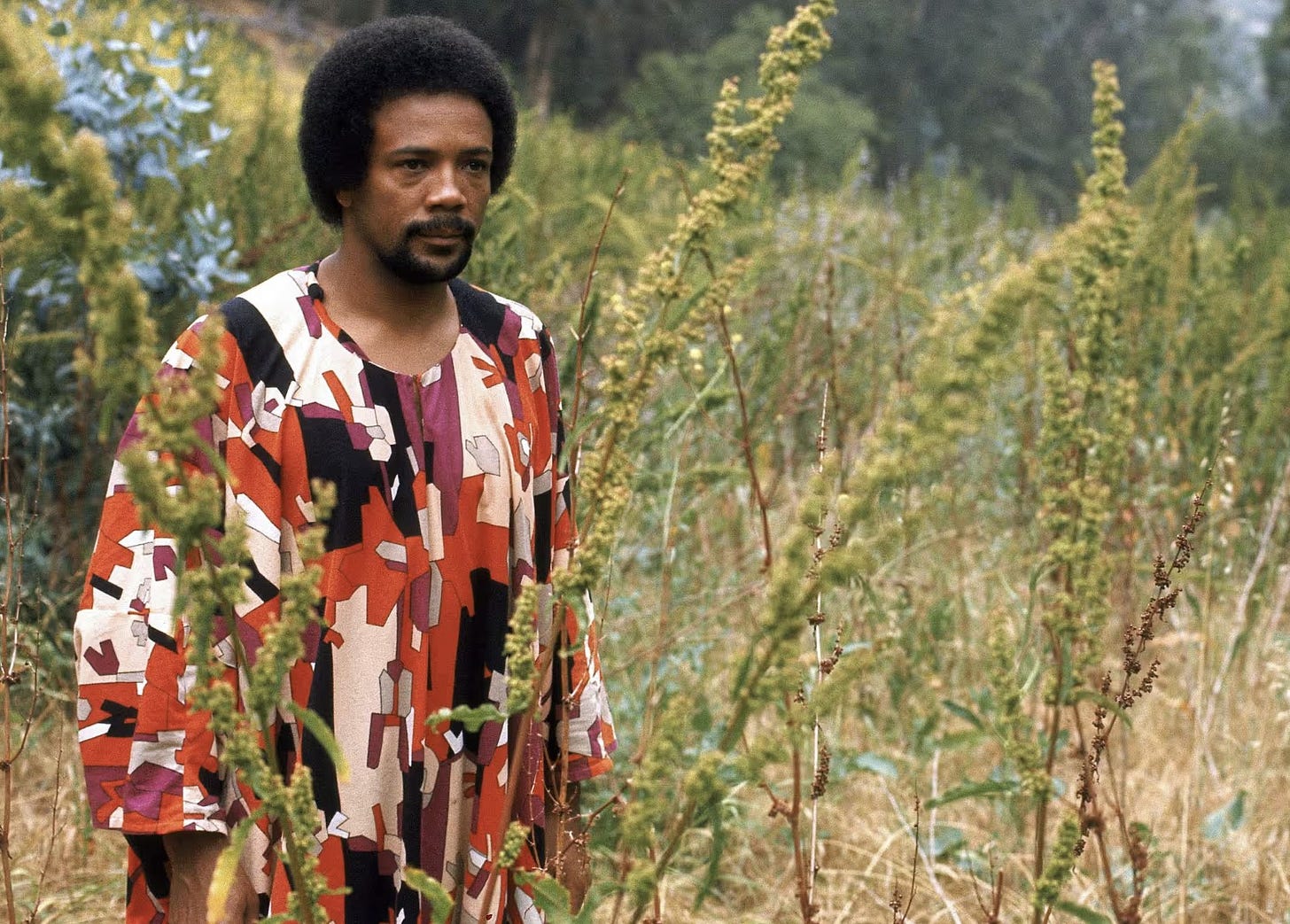
Quincy concludes:
Speaking of mysteries, there’s no telling what life might throw your way. But what should remain firm is your foundation... With a general understanding that our thoughts play an important role in the direction of our paths, it’s essential to remain proactive in training those thoughts to continue pointing north, with the assistance of guideposts, whatever form they may come in for you.
Lesson 5 - Note C# - Always Be Prepared for a Great Opportunity
This chapter underscores the importance of preparation – honing your skills and mastering your craft – so that when a significant opportunity arises, you are ready to seize it. Quincy emphasizes the value of a strong work ethic, focusing intently on any task until its completion.
He illustrates this with a story from 1958, when he received a life-changing call from Frank Sinatra. But first, he takes us back to his high school days. He and a friend formed a band, practicing diligently. Their hard work paid off when a local bandleader, Bumps Blackwell, hired them as backup singers for Billie Holiday's performance in their town. The performance was a success, and Quincy made a favourable impression on Billie's music director, Bobby Tucker.
This connection led to other opportunities, including working with the legendary Billy Eckstine. Bobby Tucker also recommended Quincy for the music director position at Barclay Records. Through this role, he collaborated with other talented musicians, constantly improving his skills. Then, the pivotal moment arrived.
Quincy writes:
One afternoon in 1958 when I was working with Eddie, we received a call from the office of Princess Grace of Monaco. They told Eddie, “Frank Sinatra is coming here to sing for the premier of his movie, Kings Go forth, and he wants you and Quincy to bring an orchestra to the Sporting Club in Monaco.” I couldn’t believe my ears. I mean the man was pretty much the most famous artist on the planet!
The show was a resounding success. Six years later, Sinatra reached out to Quincy again to collaborate on an album with Count Basie. That, too, was a triumph. They became close friends and worked together for the next 40 years.

Quincy's concluding lesson is clear:
I’m telling you, my work with Frank didn’t happen by chance. It happened because I had sharpened my tools and mastered the craft, I set out to pursue. I may not be able to control the opportunities I am presented with, but the part of the equation that I do have control over is whether or not I have prepared myself enough to accept whatever opportunities come my way.
If I hadn’t sharpened my arranging chops, I never would have been ready to accept the opportunity of a lifetime when I got that call from Frank.
He continues:
When you get the call, you won’t have time to sit around and figure out if you can do it. If you prepare yourself in advance, you’ll be able to accept whatever comes your way without even having to spend a second thinking about it.
Also, when you do a job well once, there’s almost no doubt that you’ll get it again, or get referred to someone else. Everything in your life is a chain reaction, and your ability to deliver will usually be judged based on your last encounter
Quincy's message resonates across various fields.
For me, in product management, the themes of mastery, craftsmanship, and sharpening tools are particularly relevant. Continuous improvement is key. This involves writing product reviews and deep dives, learning from other product managers, reviewing my own work, and actively seeking feedback, even when it's not always easy to hear. It's all part of the ongoing process of preparation.
Lesson 6 - Note D – Sharpen Your Left Brain
This chapter focuses on the importance of understanding the science behind your craft – sharpening your left brain. Quincy shares his relentless pursuit of knowledge to better express his creativity through music, film, and production.
In 1955, at 22, while on a US State Department music tour to Buenos Aires, he met Argentinian pianist Lalo Schifrin. They connected over their shared passion for orchestration, and Schifrin told him about Nadia Boulanger, the foremost composition teacher of the 20th century. Quincy immediately decided he would study with her, the only obstacle being that her school was in France.
Two years later, in 1957, he received a call to work at Barclay Records' Paris office. Upon arrival, he applied to Boulanger's school and was accepted. This marked the beginning of his deep dive into music composition and orchestration.
Quincy writes:
Learning how to write for strings with Nadia, and being able to simultaneously apply my newly acquired skills over at Barclay, was the knockout combo I needed… She told us, “Until you find another note learn what everybody has done with the twelve we have.”
He immersed himself in her lessons, both in class and during private sessions, where he would simply listen to her talk about music for hours. "Repeatedly studying and practicing the assignment (sharpening my left brain) provided me with the foundation I needed to become a great orchestrator, film composer, and overall musician. That infrastructure was what helped pave the way for each subsequent phase of my career."

A Career-Defining Decision
Beyond the core lesson of the chapter, Quincy shares a story about a pivotal career decision – betting on himself. In 1964, while still a vice president of A&R at Mercury Records, they merged with Philips.
Quincy recounts:
Through the mergers, Phillips made me an offer of $1,000,000 – more zeros than I had ever seen in my life – for a twenty-year contract. As much as I longed for financial security, I thought it over and it broke down to a payout of about $50,000/year. but I asked myself, “Is my life worth fifty grand a year?” I couldn’t see it.
I knew I still had much to learn about the entertainment industry as a whole. But most important, I wanted to follow my dream of going to California to get into film scoring… As grateful as I was for my role at Mercury Records, I couldn’t see myself there for the rest of my career – especially after uncovering my passion for film scoring.
As a film scorer, Quincy studied every facet of filmmaking and scoring, ensuring his left brain was prepared for any task. "Leaving Mercury turned out to be the best decision I ever made," he writes, "because in total, I went on to compose more than fifty-one film and television scores."
He concludes:
As with everything, the more you sharpen that left brain of yours, the easier your tasks will become. I promise it’s the most efficient way to excel in anything you attempt. Purposeful practice only leads to improvement, and you simply can’t have one without the other
Lesson 7 - Note D# - Avoid Paralysis from Analysis
This chapter addresses the importance of overcoming self-doubt and getting out of your own way during the creative process, allowing yourself to create freely.
Quincy writes:
When I started scoring films, the toughest parts of the creative process were spent trying to scrape away all of the unnecessary thoughts running around in my head – from internal feelings of unworthiness to external voices that verbally told me I wasn’t good enough.
I had to keep chipping away at all of those thoughts until there was absolutely nothing left but the truth – that is, my soul, and the message it wanted to communicate.
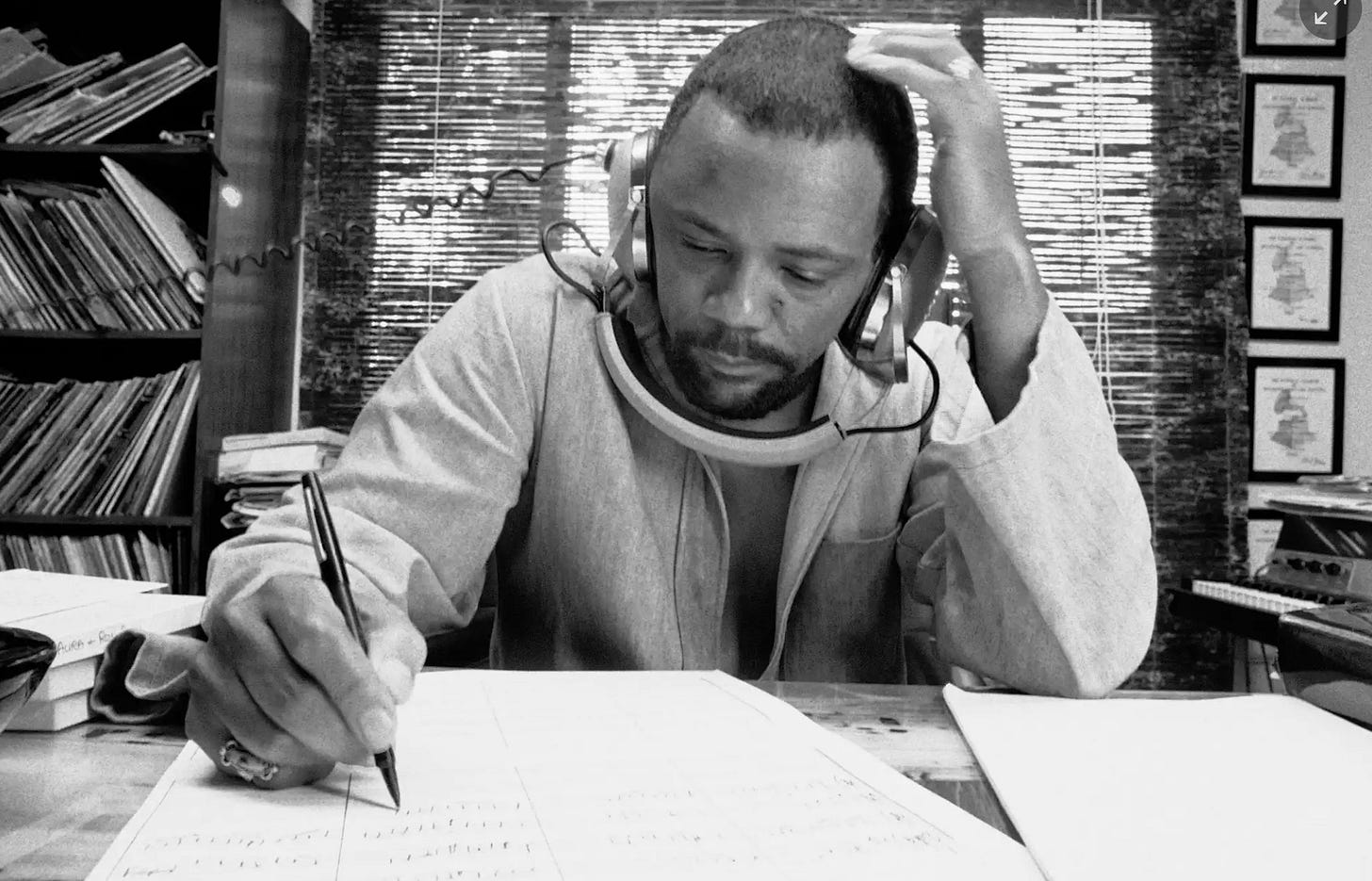
Quincy offers four techniques for silencing self-doubt:
1. Not putting yourself in a box
2. Listening to your gut instincts
3. The Goosebump Test
4. A great song and story
“So, regardless of what you are told or think you should be, never put yourself in a box, listen to your gut instincts and lean into the whispers, always go for the goosebumps, and strip everything down until you know you’ve got a great song or story” – Quincy Jones
Lesson 8 - Note E – The Power of Being Underestimated
This chapter explores how being underestimated can actually be an advantage. Quincy explains that it creates space to exceed expectations, helps avoid interference from powerful figures in your field, and keeps your ego in check.
He shares a story about meeting Michael Jackson and how their collaboration on three of Jackson's most successful albums was born from humility and hard work.
Quincy writes:
Later, when Michael approached his label, Epic Records about having me produce the album, his A&R reps told him, “No way. Quincy’s too jazzy … He’s a jazz arranger and composer”
In addition to their doubts about the level of my competency, many also wondered if Michael could make it as a solo artist in his adult years without the support of his brothers [Jackson 5].
Despite these doubts, Quincy saw the potential:
I wanted to help him with his artistic development and get him to dig deeper, with no limitations on how far he could go musically… We collectively poured 110 percent into every track and nuance of the album. The resulting record, Off the Wall, sold tens of millions of copies. It became the biggest-selling Black record in history. How’s that for being too “jazzy”?... It also became the first album to generate four American Top 10 hits.
The success of Off the Wall paved the way for Thriller (which remains the best-selling album of all time) and Bad.
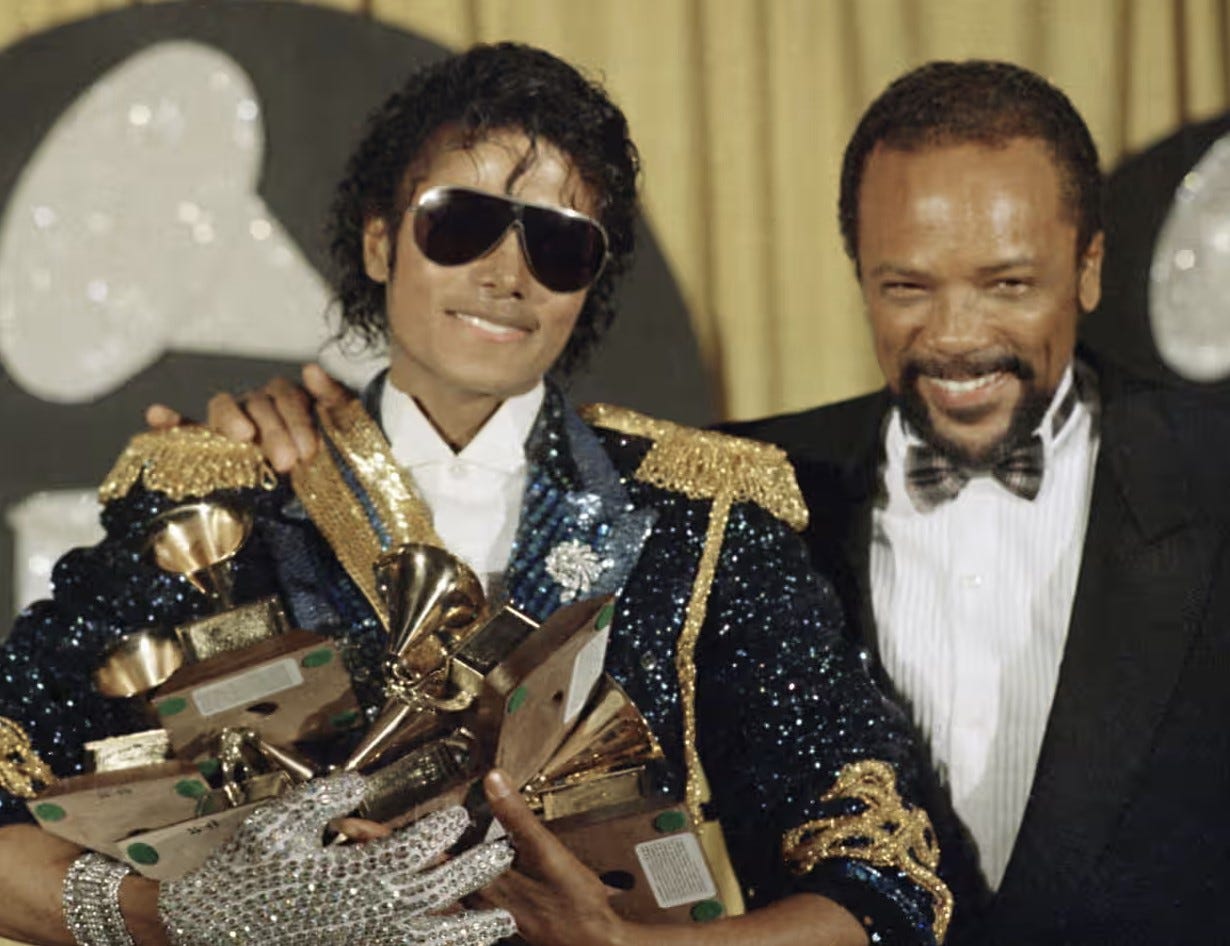
Quincy's message is clear: “People are always going to have opinions about your qualifications. What really matters is what you do with them. Focusing too much on what others have to say about you will lead you down a path to defeat before you’ve even had a chance to act. You can either entertain their scepticism or remove the chains from your creativity by allowing yourself to rise to the occasion” - Quincy Jones
A powerful reminder that our actions speak louder than any doubts others might have.
Lesson 9 - Note F – Do What’s Never Been Done Before
This lesson connects directly to the power of being underestimated. Quincy emphasizes setting audacious goals that push boundaries, foster growth, and drive innovation – doing what’s never been done before.
Quincy writes:
Dreaming big has led me to heights that I never expected, and I’ve surprised myself with my ability to be stretched in so many different directions. I sure didn’t know how my aspirations would take me, but in a way I’m glad I didn’t. If I had known, I may not have ever applied myself to the fullest extent, as a result of seeing how daunting the tasks ahead were.
He stresses the importance of self-belief and perseverance: "It’s important to not give up on yourself before you’ve even tried, so keep dreaming and putting in that work to back up those dreams. Don’t expect them to get accomplished on their own."
Quincy also acknowledges the inevitable challenges: "I have to warn you though: Big dreams don’t come without big failures. Things will get tough and you will make mistakes. Repeatedly. We’re human and we’re going to flounder, but it’s what you do to get back up that matters."
He highlights the power of individual initiative: "You may not be able to do everything on your own, but by being the spark that ignites the flame, you just might be the impetus for change that you never thought was possible, helping to prevent the 'firsts' from being the 'only'."
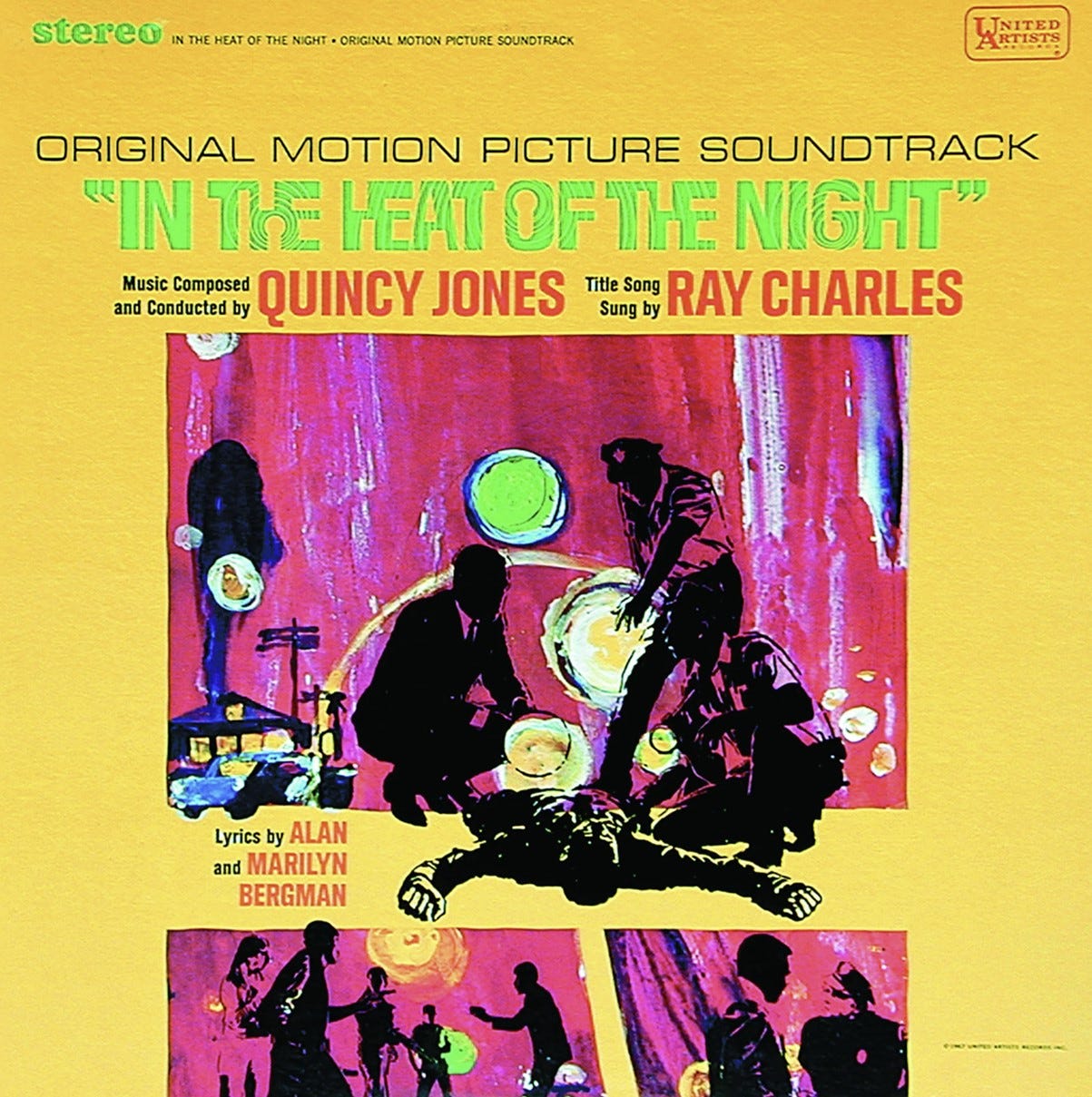
Lesson 10 - Note F# - Understand the Value of Relationships
This chapter emphasizes the crucial role of treating others well and building strong relationships, both for personal and professional success.
Quincy begins with a powerful warning:
If you do everything correctly, but don’t take heed to this next lesson I’m about to share, then it will all go to waste. So, please hear me when I say that you need to work on yourself just as much as you work on your art. If you’re not a pleasant person to be around, believe me, word travels fast.
Everything in this business, and life, revolves around relationships – the people you meet, and most important, how you treat them. You’ve really only got one shot at a reputation, and how you handle the relationships you develop along the way fills a big portion of that equation.
One of Quincy's mentors who instilled this lesson was Count Basie. Even when Quincy was just 13, Basie offered invaluable advice that would shape his future career. The most important lesson: always be fair.
Basie had secured a gig for Quincy and his band. The promoter expected 1800 attendees, but only 700 showed up. After the performance, Quincy collected the ticket sales money and was about to leave when Basie arrived.
Quincy writes:
He said, “Give the man half of his money back. He put your name out front, and people didn’t show up, That’s not his fault.”
“Are you serious?” I asked. Basie replied, “Your name was on the poster, you didn’t draw. That ain’t his fault. You may have to meet this promoter down the road again. Give him half the money back”.
Quincy continues:
I did, but I was mad. I needed that money. I earned that money. Bassie’s lesson was to “always be fair,” but it didn’t feel fair. It was my money, plain and simple.
In hindsight, I realize what he did. Through that one encounter, he taught me the importance of becoming a man of integrity because only then could I be a good businessman and musician. I could have walked away with the money since it was contractually mine, but because my name didn’t deliver what it was expected to, acting in the best interest of the promoter was the right thing to do. Basie made sure that I treated people fairly even if it meant getting the short end of the stick.
I don’t think I ever saw that promoter again. But that’s just it: Don’t do things as a way to get something in return. Do it because it is the right thing to do
Quincy concludes the chapter by emphasizing the importance of self-improvement and treating people fairly:
Always work on yourself first because then, and only then, can you become a better musician, creative, executive, or whatever else it is that you strive to be. Make decisions that you can be proud of. If it leads to positive opportunity for you, then great, if not, then at least you have a clear conscience… Gaining success is always more rewarding when you know you’ve achieved it as a result of genuine hard work, and not by cheating or getting there unethically
Lesson 11 - Note G – Share What You Know
This chapter explores the profound impact of mentorship, both in seeking guidance and in sharing your own knowledge with others. Quincy emphasizes that mentorship, though often overlooked, is a crucial element of success. It allows us to learn from those who have come before us, accelerating our own growth and development.
He defines a mentor as "simply anyone who can see the question marks or glimmer of hope in your eyes."
Quincy shares a powerful example of his own mentorship with the legendary trumpeter Clark Terry. When Count Basie's band came to town for a month-long residency, Quincy, eager for advice, approached Terry.
Quincy writes:
One day I worked up enough courage to approach Clark and asked if he’d be willing to teach me how to play the trumpet properly. After entertaining the idea for a minute, he quickly concluded that it wouldn’t be possible because he’d have to play at the theatre ‘till late, then at clubs until the middle of the night, and then he wouldn’t get back to his hotel until the early morning, and after that, he’d sleep during the day until he’d have to do it all over again.
After a second thought, he reconsidered. “Well, you’re in school while I’m sleeping. And you’re sleeping when I’m working. How are we gonna solve that?”. “Well, I could get up early and come to you before I go to school for a couple of hours” I replied.
To my surprise, he agreed. The very next day at six a.m. I showed up at his hotel room soon after he had fallen asleep, and knocked on the door to wake him up. I returned every day that month, and he taught me everything from technique to style to diaphragmatic breathing.
The impact was profound. "He believed in my potential, and he was considerate enough to encourage me. His unfailing support supplied me with hope that I could someday be like him."
Throughout his 95 years, Clark Terry served as a mentor, teacher, father figure, and friend to Quincy, Miles Davis, and countless others.
Quincy concludes by connecting mentorship to the idea of stewardship – passing on what we know to the next generation:
Those who come after us are the future, plain and simple. You don’t need to be some type of celebrity or have a massive platform to be mentored or to become a mentor; it simply comes down to finding someone who believes in you, and finding someone else you believe in.
Think about a figure you respect, then learn everything about what they did and do. The main way to further understand how people before you have made it to where they are is watch, pay attention, shut up, and listen. All I wanted was to hear what Clark had to say.
Here’s my advice for this: Reflect on three people ahead of you in your career – how can you learn from them? Then, consider someone just starting out in your field – how can you support them and share your knowledge?
I guess this newsletter is a form of mentorship 😊
Lesson 12 - Note G# - Recognize the Value of Life
In this final chapter, Quincy emphasizes the importance of reflection, presence, gratitude, and the power of family and friends.
He shares two near-death experiences – a brain aneurysm and a diabetic coma – that brought into sharp focus the significance of love, family, and the need to eliminate negative habits (like alcohol and cigarettes) that hinder a full life.
Quincy writes:
After cleaning up my[drinking] act in 2015, it felt like I could see clearly in every possible direction. My life is more full now than ever because I can answer the question of why I do what I do: family, spreading hope and love through my creativity, and hopefully have a positive impact in the lives of those I encounter.
Closing Thoughts
This was an excellent book. In 176 pages the book was full with helpful lessons to live a more creative and purposeful life. I read it twice in 2024. I like how he offers inspiration and guidance, and also includes stories of his own experiences.
I wholeheartedly recommend 12 Notes On Life and Creativity by Quincy Jones because I believe it would positively change your life.
While reading this book, I kept on reflecting on how I could become a better Product Manager and Entrepreneur. Learning the science of my craft, developing relationships, but also investing in being a great person.
Quincy Jones powerfully summarizes the key lessons of the book:
I’m telling you right now: Recycle your pain, if you can see it you can be it, go to know, establish your guideposts, always be prepared for a great opportunity, sharpen your left brain, avoid paralysis from analysis, understand the power of being underestimated, do what’s never been done before, value relationships, and most important, recognize the beauty and inherent value of life.
His closing message is one of love and connection:
And tell your family – I’m not just talking about blood relatives – that you love them. Tell your friends you miss them. Be there for people, not only when they need you, but even when they don’t
Quincy Jones died on November 3rd 2024, aged 91 at his home, surrounded by family.
Thank you, Quincy. Good night.
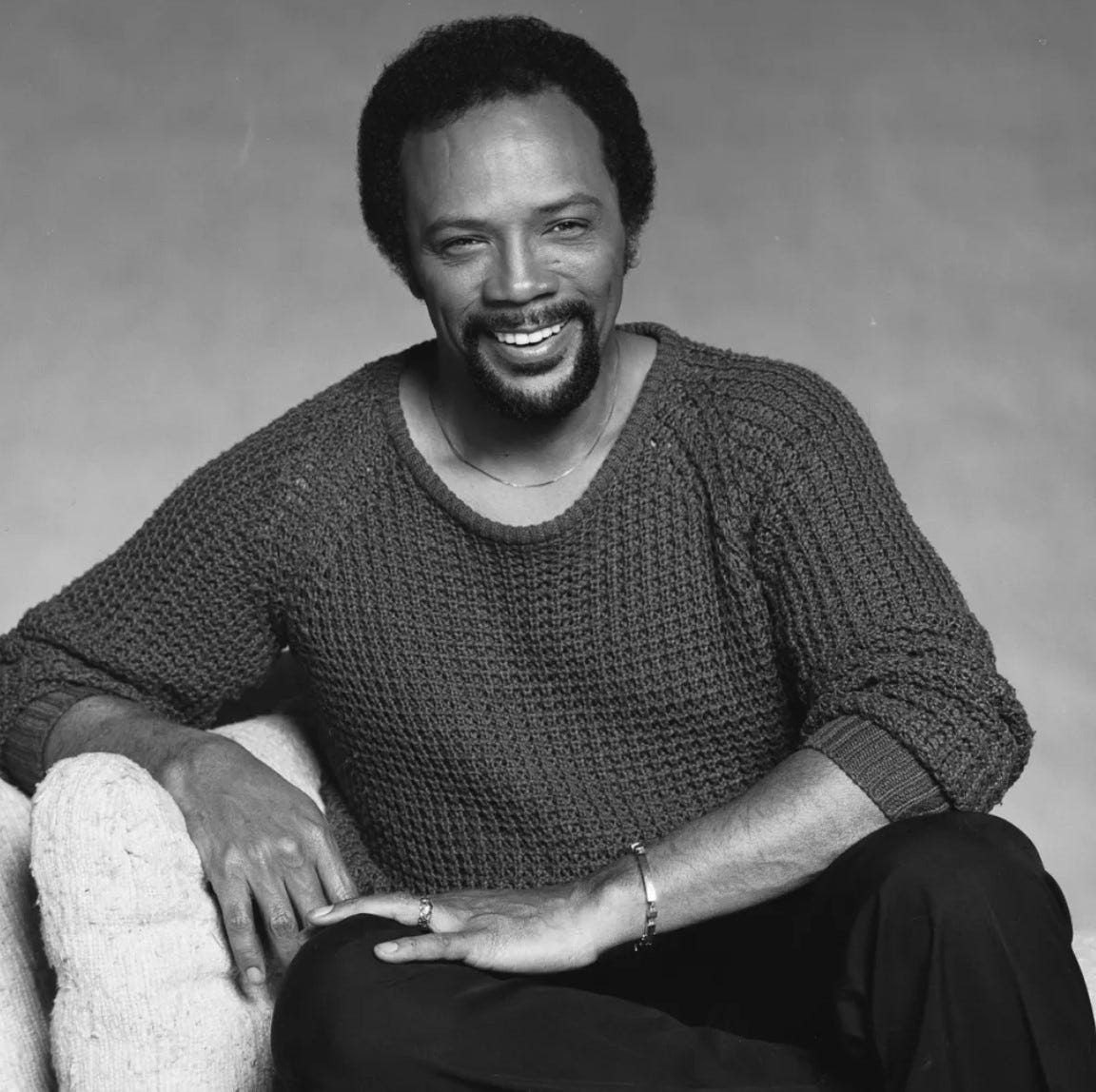
There you have it.
Here are more resources about Quincy Jones: Music Playlist, Photobook 1, and Photobook 2.
If you enjoyed this article, I have written other book reviews, career articles, and business lessons.
Subscribe now at nerookwa.substack.com, and consider sharing it with friends and colleagues.
Would you like to read more career focused articles or something else? Is there a topic you currently struggle with? Let me know. You can message me at notesbynero@gmail.com.
Thanks for reading and bye for now.
Nero
The Best is Yet to Come




